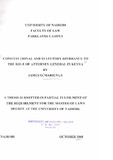| dc.description.abstract | The twenty-first century has been ushered by quest for good governance in many constitutional democratic countries. These countries have embraced constitutionalism and democracy within their socio-political order as the basis of good governance. The purpose is to have a government with checks and balances. The current trend to achieve this is by peoples' empowerment to hold the government accountable through parliament and other government institutions. This is because it has been realised, globally, that good governance is the basis for socio-economic and political development. Good governance includes accountability and transparency, separation of powers and democracy. However, good governance requires sound, effective, responsive institutions which are transparent and accountable to the people. Hence, many countries are striving to introduce legal reforms for purposes of improving governance.
One of the critical institutions which is central to these legal reforms is the office of the Attorney-General. The office of the Attorney-General in an unusual one in parliamentary democracy. In some ways, it symbolizes the difficulties inherent in the doctrine of separation of powers and rule of law. The Attorney General is part of the executive, and generally speaking, a member of the legislature. At the same time, the Attorney-General also owes certain duties to the judiciary. On occasion, these demands have collided leading to the blame of the Attorneys-General and the need for constitutional and statutory reforms of this office.
With current political trend of empowering the people to hold the government accountable through their representatives in parliament, the Attorney General is being seen as people's lawyer rather than executive's lawyer in the administration of justice and rule of law. Hence, the need to strengthen the Attorney General's institutional, adjudicative and administrative independence. A historical background, legal and structural basis of the Attorney General in developing and developed democracies analyzed in this work discloses the framework within which the Attorneys-General operate. Key question answered by this thesis is whether the constitutional independence given to the office of Attorney-General in Kenya is sufficient or is there need for legal reforms to make it more responsive and accountable to the people. These would include constitutional and statutory reforms. This is important bearing in mind that Kenya is currently undergoing constitutional reform. In considering the main issues, comparative analysis of the office of the Attorney-General in Kenya with reference to other countries, particularly those with similar jurisdictions has been attempted and contrasts outlined. | en_US |

